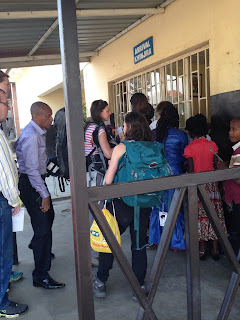We held two focus groups over a period of two
weeks focusing on HIV stigma at boarding school for children ages 17-24. The idea to hold focus groups with boarding
school students developed after several meetings with the clinical staff
including the medical director, Dr. Gilbert, and the psychosocial counselors,
Edmund and Laetitia. We were assisted by
the research team, Charles, Josette and Aíme. A list of increasingly open-ended questions was
composed and translated into Kinyarwanda prefaced by an introductory paragraph explaining
the purpose of the focus group and asking for verbal consent. The participants were reminded multiple times
that their names and answers would remain private and only be shared with
healthcare providers within WE-ACTx. The
facilitator also explained how the information shared during the focus group could
help improve the care of their peers at WE-ACTx For Hope clinic.
The first focus group was held on July 10th,
2016 at Sainte Famille Primary School in Kigali and consisted of 10
participants with an average age of 18.5 and included 6 males and 4 females. Each of these participants had been previously
enrolled in boarding school. Stephanie was
the facilitator with Leontine and Aíme serving as Kinyarwanda translators. The entire session was held in Kinyarwanda and
translated into English for Stephanie and Lizzy. Lizzy took notes in English and Augustin took
notes in Kinyarwanda.
The second focus group was held on July 20th,
2016 in the conference room of the WE-ACTx For Hope clinic in Kigali. There were 4 participants with one having
previously attended the first focus group on July 10th. Of the participants, the average age was
20.25 with 1 male and 3 females. Stephanie
once again served as the facilitator with Aíme translating and assisting in
facilitation where possible. Both Aíme
and Augustin took notes in Kinyarwanda while Lizzy took notes in English.
















